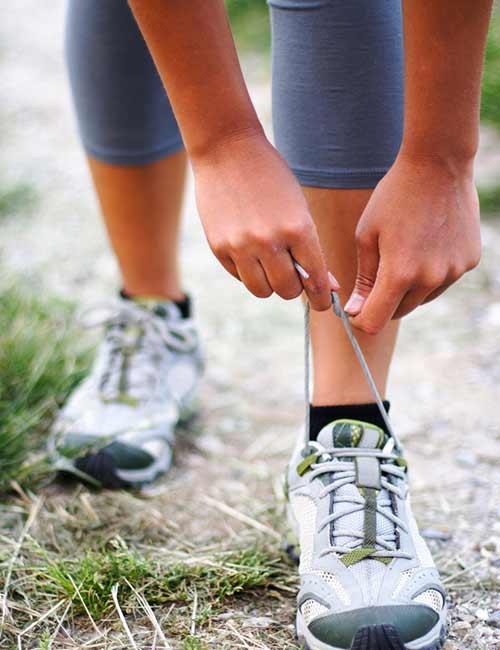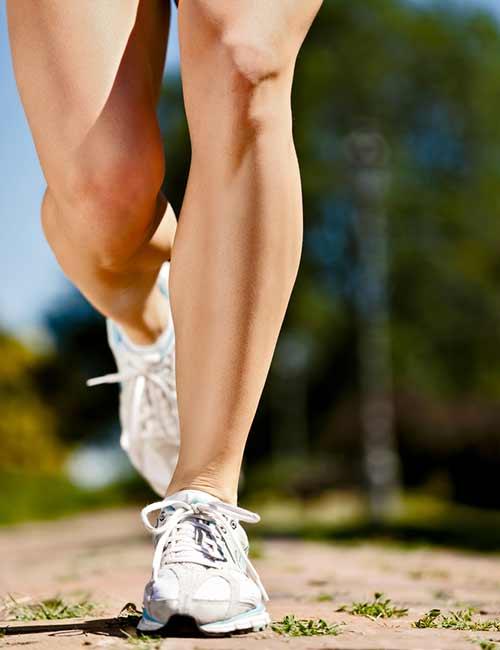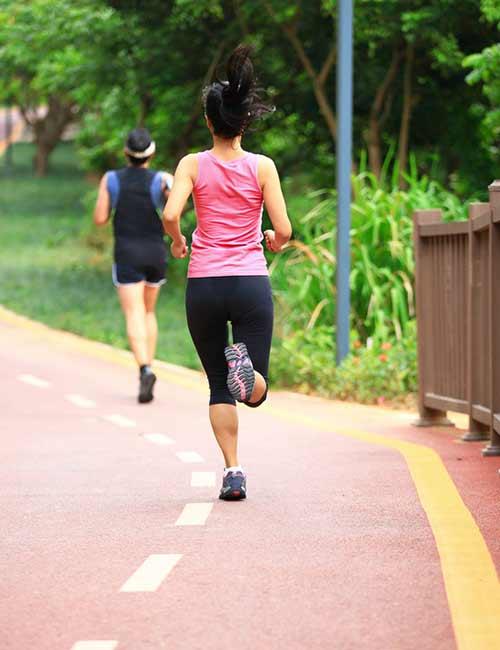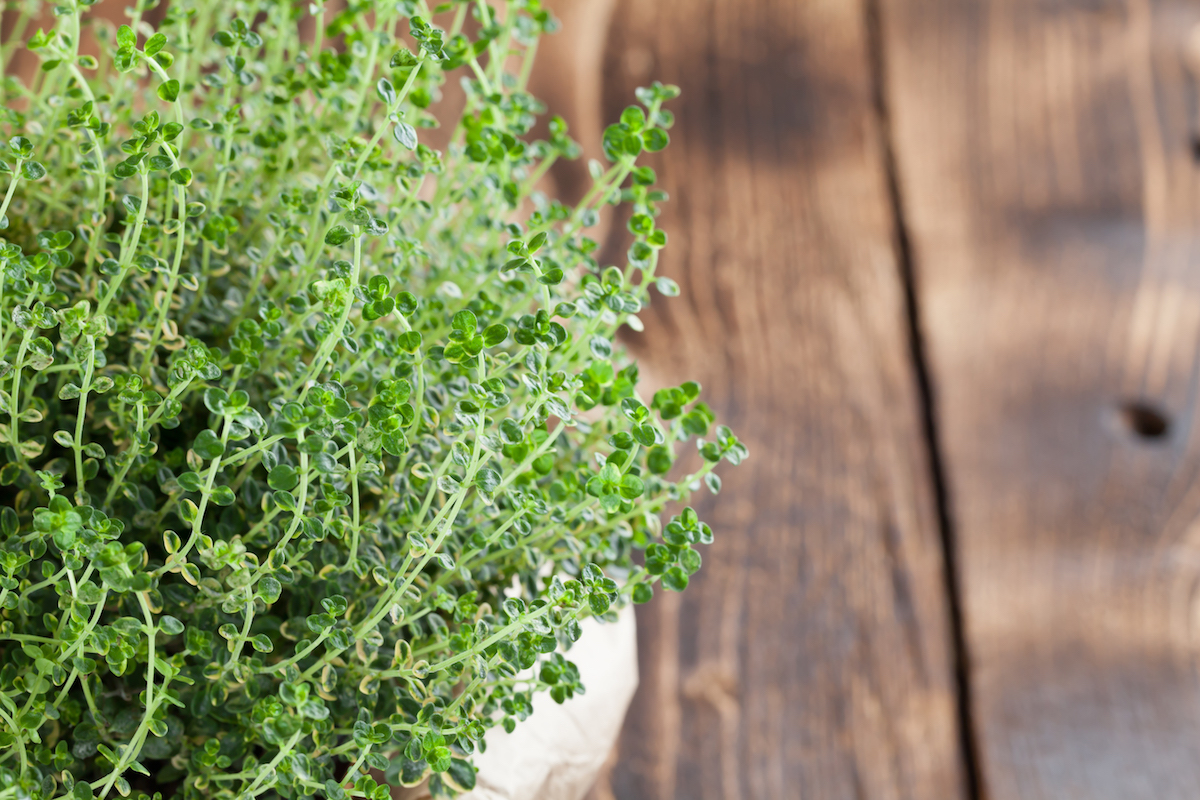
Running is a free exercise you can do anywhere. Jogging for 30-40 minutes three times a week is an excellent way to improve your fitness and to keep you healthy. Doing it regularly can build your stamina and decrease the risk of cardiovascular diseases, obesity, diabetes, hypertension, anxiety, and depression.
To make running a safe and enjoyable experience you should know some tips before you start. Read on to find out 20 effective and crucial jogging tips that can help a complete beginner as well as a pro.
Top 20 Key Jogging Tips That You Should Know
1. Warm-up

Warm-up is extremely important when it comes to starting any type of exercise. Your muscles undergo constant contraction and relaxation when you jog. Unless you prep your muscles to do so, you can get muscle cramps and may not be able to walk or jog properly. Warming up helps you prep the muscles for the endurance training that you are going to do. You will be able to job more effectively without the risk of injuring yourself.
2. Set A Goal
A goal without a plan is just a wish. So, you must set a daily or weekly goal for yourself. Write down your goal on a piece of paper. For example, "I will jog 2 miles today, and by the end of the month, I should be able to jog 5 miles at a stretch." This goal will keep you motivated and focused, and you will soon be able to run long distances without feeling weak or out of breath.
3. Wear Running Shoes

The next most important thing is to wear the right shoes. Shoes help protect your feet and bones from the impact of the thrust they experience when you jog. Wear comfortable running or training shoes. Talk to an orthopedic doctor if you need specially made orthopedic shoes for jogging.
4. Loosen Up
Loosen up your body so that all the tension from your shoulders, neck, arms, legs, and feet is released. Doing this will help you jog for a long duration and prevent your muscles from cramping. Shake your hands and feet to loosen up your body.
5. Push Your Chest Out

Many joggers slouch and jog. Not only is this incorrect, but your posture and spine health also take a hit. Whether you are jogging on the treadmill, the road, or a trail, make sure your chest is out, and shoulders rolled back to prevent spinal injuries and improve your posture.
6. Start Slowly
Start slowly by walking first. Increase your walking pace after 30 seconds. By the end of 60 seconds, you should be brisk walking. Then, start jogging at a slow pace. This technique will prevent you from burning out quickly. You will be able to jog for a long distance easily, which, in turn, will make you fitter and healthier quickly.
7. Land Softly

Stomping your feet will only injure your knees. So, it is important to land softly on the ground on the balls of your feet to dissipate the shock and not directly hit your knees. It will also help you stay strong and jog for a longer duration than you expect yourself to.
8. Use Breathing Techniques
Breathing is THE most important part of jogging. Because unless you breathe at a particular rhythm, constantly, you will not be able to pump enough oxygen into your cells. This can lead to muscle fatigue, thereby preventing you from jogging for a long duration. Count your steps and breathe in and out. For example, breathe in slowly through your nose for four steps and then exhale slowly through your nose for the next four steps. Also, when you are almost fatigued and feel like giving up, start breathing in through the nose and exhaling with force through your mouth. It will help pump in oxygen and pump out carbon dioxide quickly from your body.
9. Jog In Different Directions

Jogging in zig-zag and lateral motions and changing direction frequently will help train your leg muscles to be able to run on any kind of road or trail. You can run uphill and downhill, on rocky roads or race tracks. This will also make sure that you are burning enough calories, and your brain-body coordination is at its best.
10. Talk To Yourself
The difference between a beginner and a pro is not entirely physical fitness. A lot of it has got to do with willpower and perseverance. The best way to build strong willpower is to talk to yourself when you are jogging. Keep motivating yourself by counting the steps and thinking about the benefits you will reap and the adrenaline rush you will get by covering your target distance. Every time you feel like giving up, talk yourself to jog 10 steps more. This way, you will be able to jog long distances.
11. Look For Landmarks

Looking for landmarks is another strategy to help you jog longer. Look for a tree, a milestone, calories you burn, or a building so that you can decide when to take rest or walk instead of running. After 10 seconds, start jogging again.
12. Time Your Steps
Timing your steps is an effective way to improve your jog. Set your goal to jog for 30 steps before taking rest. Increase this number as you start becoming more comfortable with jogging every day.
13. Train In Intervals

Jogging regularly is equivalent to training for an upcoming marathon or any other sports event. The best way to start doing that is to jog for 5 minutes and take 20 seconds rest. This interval training will help you jog longer and not get worn out.
14. Practice Box Jumps
Box jumps are good for strength conditioning and improving muscle power and reaction time. They help train the muscles of your legs, especially when you jog on trails. Box jumps strengthen your thighs and glutes, which makes it easy for you to jog 5 miles at a stretch.
15. Train Downhill

Jogging downhill with control is more difficult than running uphill. So, practice jogging downhill without falling or hurling down. It will help build muscle control and improve your jogging technique.
16. Plank
Planks are amazing for building core strength. From standing up to jogging, every human body motion requires good core strength. If your core is not strong enough, you will not be able to jog for a long duration. Start doing 3 sets of 30-60 seconds hold elbow planks and increase your core strength.
17. Drink Water

Dehydration can also wear out your muscles. So, drink 3-4 liters of water per day. Also, keep a small sipper with you when you jog so that you can keep yourself hydrated and do not give up quickly. However, make sure you don't drink too much water while jogging. Take a sip or two when you stop or walk to rest for 10-20 seconds.
18. Beat Yourself
You are your own competition. If you jogged a mile at a stretch today, jog for 5 minutes more after you hit the 1-mile mark. This will keep you motivated, and instead of comparing yourself with anyone else, you will have a healthy relationship with yourself and be able to move forward and strive to be better than you were yesterday.
19. Stretch

After you are done with your run, it's time to do cool down stretches. Stretching after a run is as important as warming up before running. Cooling down will help your muscles recover quickly and protect you from muscle injury. Stretch your hamstrings, calves, shoulders, arms, neck, and back.
20. Sleep
Sleeping and resting help your muscles rejuvenate and recover. When you run, your muscles undergo wear and tear. Resting and sleeping help the muscles rebuild themselves bigger and stronger. Sleep for at least 6 to 7 hours, within 2-3 hours of having dinner, and listen to soothing music if that helps you fall asleep.
These are the 20 best jogging tips. But what are the benefits of keeping fit by jogging every day? Find out next.
Jogging Benefits
Jogging regularly:
- Improves cardiovascular health.
- Helps burn calories and aids weight loss.
- Improves lung health.
- Boosts stamina and endurance.
- Improves muscle flexibility.
- Builds core strength.
- Strengthens the muscles in your lower body.
- Keeps stress and anxiety at bay.
- Lowers depression.
- Lowers the risk of certain types of cancer.
- Fights diabetes.
So, you see, all this confirms my previous statements - there's no reason you shouldn't jog, and it would be the best decision you have ever taken. Get the right shoes and start jogging. Live healthy and live long. Take care!




